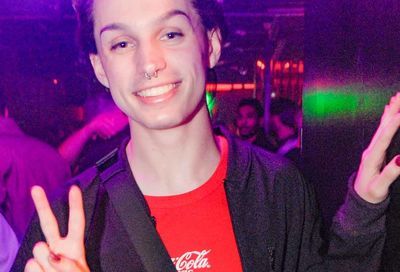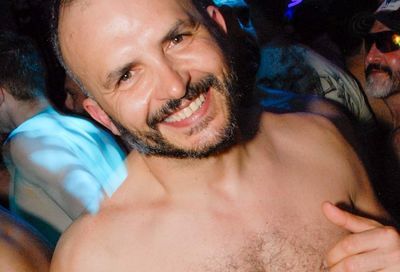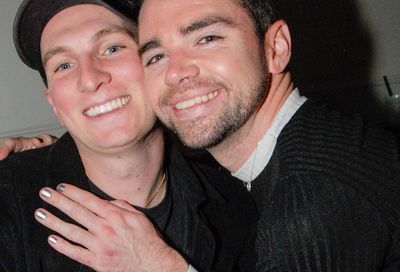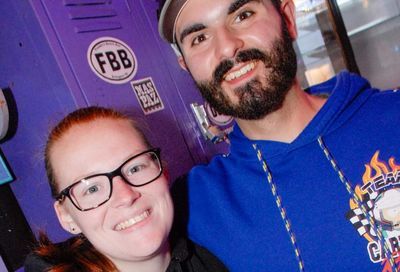Room to Grow
With new grant, programs, The Center maintains pace and looks to growth
The glut of gifting holidays may be some weeks off, but The Center, ”Home for GLBT in Metro DC,” announced an early present Oct. 19. At a low-key fundraiser that evening with about 35 people, The Center formally announced a $100,000 grant from the district for The Center’s D.C. Crystal Meth Working Group. The event also provided Center supporters a chance to thank gay City Councilmember David Catania (I), who chairs the Council’s Committee on Health, for his role in securing the money.
”We really did this to put a little momentum behind the Crystal Meth Working Group, to announce the grant and to thank David Catania for really hearing the message,” says Michael Sessa, president of The Center.
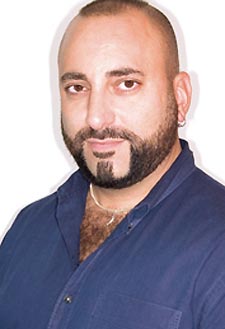 Michael Sessa (Photo by Todd Franson/file photo) |
The D.C. Crystal Meth Working Group is the entity that evolved from, among other things, a May 2005 community forum about the drug, sponsored by The Center, Brother Help Thyself and Titan.
”The $100,000 grant to the Crystal Meth Working Group represents an expansion of a collaborative effort with [the Addiction Prevention and Recovery Administration] to educate, raise awareness, and conduct outreach regarding crystal meth to vulnerable populations at the grassroots level,” reads in part a statement from the Committee on Health. And that’s exactly what they’ll get, says Sessa, who testified before the Council to help secure the grant.
The funds, which Sessa says The Center expects to receive soon, will help take some of the burden off the Working Group’s all-volunteer labor, as well as expand the outreach already underway. It’s needed relief, considering the figures from Whitman-Walker Clinic and other sources cited in The Center’s literature. Those numbers argue that as many as 20 percent of gay men use, or have used, this addictive drug that can give users a feeling of ”hyper sexualization.” Whitman-Walker Clinic has reported a five-fold increase in the number of people seeking help for meth addiction since 2000.
”Part of the issue is there’s not enough data,” adds Sessa, pointing to ways the grant will help. ”We’re looking at a concerted effort on gathering data Â… and translating some of our information into Spanish.”
Also planned, says Sessa, is more outreach in nightclubs and bars, as well as at events such as Black Pride and Capital Pride. The financial support will relieve the volunteers, from outreach workers to graphic designers.
”Volunteer fatigue sets in after a while. We’ve been doing this for a year and a half.”
Though it may be hard to top the Working Group’s grant, Sessa says the Oct. 19 event also helped raise between $2,000 and $2,500 for The Center itself, which is currently running an intergenerational discussion series entitled ”Twinks and Geezers: Bridging the Gay Generational Divide.” The series of four discussions began Oct. 24, creating a potential scheduling conflict, says Joe Palacios, a Center board member.
”It was the night of the High Heel Race. We had 18 people, but I was expecting a disaster,” Palacios says of the date snafu, adding that the title of the series has generated some complaints. ”We came up with a catchy title that turned out to be controversial. But we wanted to be provocative, otherwise we might not have gotten attention…. We may not like stereotypes, but if we’re going to get into dialogue, they can be helpful if they’re handled appropriately.”
The third of the four discussions, ”Coming Out: From Back in the Day to the Hip Hop Way,” is scheduled for Thursday, Nov. 9, at the Human Rights Campaign’s Equality Center, 1640 Rhode Island Ave. NW, at 7:30 p.m.
Though the grant, the fundraiser and the discussion series indicate that The Center is maintaining its mission to ”celebrate, strengthen and support” the area’s GLBT community, Sessa says that creating some sort of drop-in venue for The Center is the top strategic goal for the near future, important for The Center’s mission and for raising its profile in the community.
”The more I talk to people, the more they say we need to be doing more,” admits Sessa, countering that while The Center offers a computer lab, meeting space, and a number of other components to help the community, much of it falls below the collective GLBT radar.
”I’d love it if we could find a little storefront. That’s our biggest challenge right now, fulfilling the expectation of what people think of as a community center, being more visible. It doesn’t have to be big, but it has to be drop-in.”
Visit The Center online at www.thedccenter.org.
Support Metro Weekly’s Journalism
These are challenging times for news organizations. And yet it’s crucial we stay active and provide vital resources and information to both our local readers and the world. So won’t you please take a moment and consider supporting Metro Weekly with a membership? For as little as $5 a month, you can help ensure Metro Weekly magazine and MetroWeekly.com remain free, viable resources as we provide the best, most diverse, culturally-resonant LGBTQ coverage in both the D.C. region and around the world. Memberships come with exclusive perks and discounts, your own personal digital delivery of each week’s magazine (and an archive), access to our Member's Lounge when it launches this fall, and exclusive members-only items like Metro Weekly Membership Mugs and Tote Bags! Check out all our membership levels here and please join us today!



















